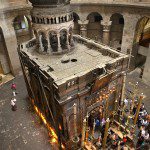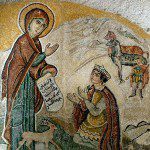
In the spiritual classic, The Way of a Pilgrim and The Pilgrim Continues His Way, a discussion on spiritual direction ensued. What were we to do if we had no spiritual director? We should, it was said, search for one, but until God sends one our way, we should be able to be directed from and learn from anyone around us. With the proper spirit, we can be directed by the wisdom of anyone we meet with, for all people have something to offer and show us if reach out to them with a discerning spirit. Even a Saracen, that is, a Muslim, could offer us direction:
In this regard, it is also important to keep in mind that he who is sincere in his spiritual search will recognize true instructions even when it comes from simple, ordinary people. The Fathers say that if with faith and the right attitude you ask even a Saracen, you can gain valuable insights; but without faith and the right intention, even if you ask a prophet for direction, you will not be satisfied. We see an example of this in Macarius the Great of Egypt, who once received instruction from a simple peasant who enabled him to overcome his difficulties. [1]
The wise are humble and are able to learn from all, while the foolish are closed-minded, and are quick to decry the truth others have because they are other. Fools will reject the wisdom of Muslims just because they are Muslims, yet the wise will be able to know that a Muslim with a great devotion to God can and will offer something to us if we are open to it with a spirit of love. If we are not, then even a prophet of God will not be able to direct us – we need only examine the history of Israel to see the truth of this statement.
This openness to the other, even if they are outside of our religious sensibility and so are unorthodox in beliefs (and truly, there is a wide possible range here), comes out of trust in God and following God’s command to love all. How can we love all if we push them aside, if we avoid them, and if we denigrate them and believe they have nothing worthy to offer us in those things which matter most, that is, matters of the spirit? To say they can and will help direct us in our spiritual progression is not to say we have to believe their theology, rather, we can gain from what they have learned in regards spiritual discipline. All persons are made in the image and likeness of God, and all persons reflect something of God in and through themselves, and so all persons are capable of offering us insight. We just have to go with the right spirit toward them, a spirit of humble love, willing to engage them and listen to them and see what God is able to offer us through them.
The fact that others have rays of truth which we can and should affirm was officially declared by Vatican Council II in Nostra Aetate:
The Catholic Church rejects nothing that is true and holy in these religions. She regards with sincere reverence those ways of conduct and of life, those precepts and teachings which, though differing in many aspects from the ones she holds and sets forth, nonetheless often reflect a ray of that Truth which enlightens all men.[2]
For this reason we are to open up and explore those truths in dialogue, willing to learn from the other the spiritual and moral good which they have attained:
The Church, therefore, exhorts her sons, that through dialogue and collaboration with the followers of other religions, carried out with prudence and love and in witness to the Christian faith and life, they recognize, preserve and promote the good things, spiritual and moral, as well as the socio-cultural values found among these men.[3]
This is especially true with Islam, where we have a great deal in common, allowing us to hold to Muslims in esteem:
The Church regards with esteem also the Moslems. They adore the one God, living and subsisting in Himself; merciful and all- powerful, the Creator of heaven and earth, who has spoken to men; they take pains to submit wholeheartedly to even His inscrutable decrees, just as Abraham, with whom the faith of Islam takes pleasure in linking itself, submitted to God. Though they do not acknowledge Jesus as God, they revere Him as a prophet. They also honor Mary, His virgin Mother; at times they even call on her with devotion. In addition, they await the day of judgment when God will render their deserts to all those who have been raised up from the dead. Finally, they value the moral life and worship God especially through prayer, almsgiving and fasting.
Since in the course of centuries not a few quarrels and hostilities have arisen between Christians and Moslems, this sacred synod urges all to forget the past and to work sincerely for mutual understanding and to preserve as well as to promote together for the benefit of all mankind social justice and moral welfare, as well as peace and freedom.[4]
By being open to Muslims and the spiritual awareness those Muslims who love God have attained, we find ourselves coming to know and love God more as well. Likewise, we find a growth in friendship with Muslims when we come to them with such good will – as long as we go to them only with Satanic hostility, there is no way we will be able to form the bonds of love which God intends us to have with them and with all others around the world. If we are willing to appreciate and esteem the good which is within Islam, instead of demeaning all the teachings of Islam, not only will our relationship with Muslims improve, we will find our relationship with God improves as we learn from them the forms of wisdom which God has granted to them due to their piety. Miracles happen when we truly put our trust in God and follow him as he would have us to act with open love to all.
Lastly, we can find ourselves challenged by our interaction with others. Not only can they help direct us in our spiritual discipline, they can encourage us in a friendly way to find new devotions to God which we can then share with them, as they share theirs with us. It can be a friendly rivalry where we work with each other to improve each other to be the best we can all be. This was exactly the point Nicholas of Cusa made several hundred years ago:
Where conformity of mode cannot be had, nations are entitled to their own devotions and ceremonies, provided faith and peace be maintained. Perhaps as a result of a certain diversity devotion will even be increased, since each nation will endeavor with zeal and diligence to make its own rite more splendid, in order that in this respect it may excel some other [nation] and thereby obtain greater merit with God and [greater] praise in the world.[5]
By learning from the other and seeing where their devotions and way of life are better than ours, we can feel challenged to imitate and then exceed them. Of course, this is dependent upon our fidelity to God and with it, our reception of the grace from God. But we see how rivalry due to distinction does not have to end in hate and violence, but mutual appreciation and encouragement. Even when there is no unity of faith in the dogmatic level, there is the basic faith of natural revelation, where we can be said to be united under the “God of the philosophers,” allowing this truth to be lived out, even if in and through it, we are to also encourage the other to rise with us in our understanding of God through the revelation we received in Jesus Christ.
[1] Helen Bacovcin, trans. The Way of A Pilgrim and The Pilgrim Continues His Way (New York: Image Books, 1992), 166-7.
[2] Nostra Aetate. Vatican Translation. ¶2.
[3] Nostra Aetate. Vatican Translation. ¶3
[4] Nostra Aetate. Vatican Translation. ¶3.
[5] Nicholas of Cusa. De Pace Fidei in Nicholas of Cusa’s De Pace Fidei and Cribratio Alkorani: Translation and Analysis. trans. Jasper Hopkins (Minneapolis: Arthur J. Banning Press, 1994), 70.
Stay in touch! Like A Little Bit of Nothing on Facebook:
A Little Bit of Nothing













